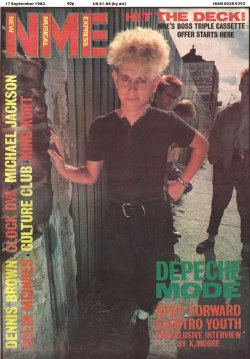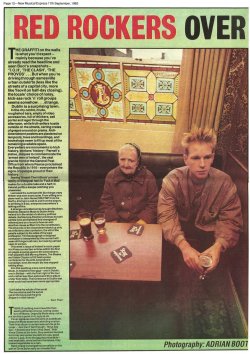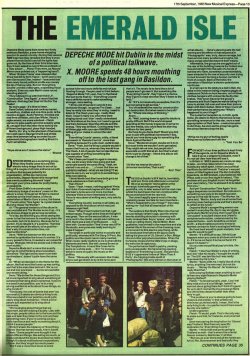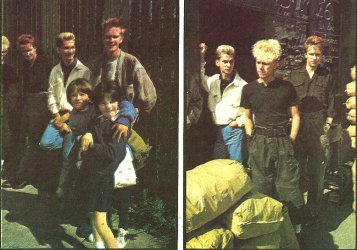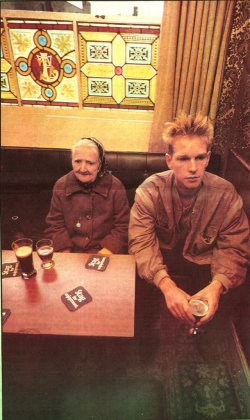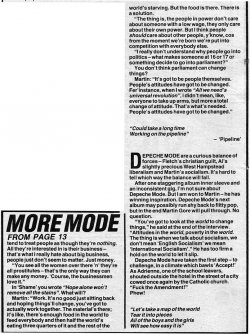Red Rockers Over The Emerald Isle
[NME, 17th September 1983. Words: X. Moore. Pictures: Adrian Boot.]
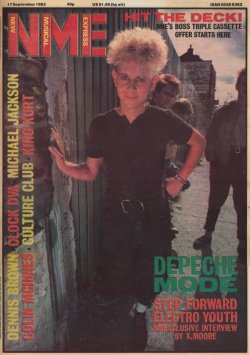
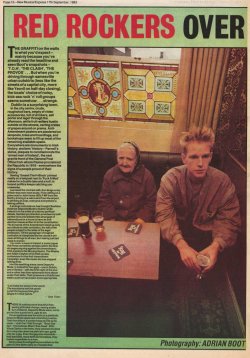
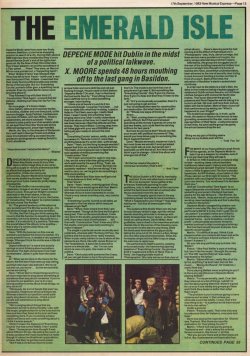
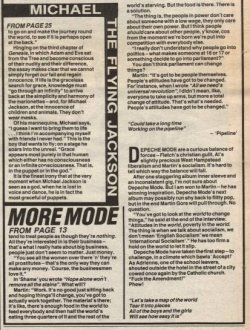
RED ROCKERS OVER THE EMERALD ISLE
The graffiti on the walls is what you’d expect – mainly because you’ve already read the headline and seen Boot’s snapshots – “T.O.H.”, “THE CLASH”, “THE PROVOS”… But when you’re driving through samesville urban outskirts (less like the streets of a capital city, more like Yeovil on half-day closing), the locals’ choice of noisy, kick-ass rock’n’roll groups seems somehow… strange.
Dublin is a surprising town.
In the city centre, crude, roughshod bars, empty of video accessories, full of drinkers, sell porter and lager through the afternoon, while fruit-sellers hustle outside on the streets, carting crates of grapes around on prams. Anti-Amendment posters are plastered on lampposts, trees and hoardings, and bookshops seem to full up most of the remaining available space.
Everywhere monuments to Irish history, workers’ history – Parnell’s statue, plaques to commemorate the “armed men of Ireland”, the vast granite front of the General Post Office from where Pearse proclaimed the Republic in 1916 – everywhere the signs of a people proud of their history.
Seeing “Smash The H-Block” printed neatly on a lamppost next to “Fuck A Mod” makes for a double take and a half; in Ireland politics keeps catching you unawares.
Last week the contrast with Sun-bingo crazy Britain was even more acute. From sitting on a plane next to John Hume (SDLP MP from the North), driving in a cab to and from the airport, to drinking in a bar, everyone everywhere’s talking politics.
A strange coincidence has brought Basildon Bolshies Depeche Mode to Dublin while Ireland is in the midst of a stormy political debate. Garbled pre-election promises by both parties have precipitated this strangest of referendums on a move to have an anti-abortion clause written in to the constitution. The 42 words of the Amendment stand up only as a tribute to utter confusion, the will of the people subject to the wiles of the legal profession. Till the paragraph of inspired confusion is interpreted by the courts it will mean all things to all men, but mainly just bad news to women.
This week’s issue of Ireland’s music paper Hot Press carried two articles within the first six pages arguing against the Amendment; Irish popsters like Moving Hearts, The Blades and Adam Clayton of U2 held a press conference for the Anti-Amendment Campaign; even the music biz has stopped talking shop.
Into this seething arena came Depeche Mode, in Ireland for two gigs – one in Dublin, one in Belfast – with the first night of the tour and a rather less than ephemeral third album under their belts. Their presence in Dublin last week could not have been more appropriate.
“Let’s take the whole of the world
The mountains and the sands
Let all the boys and the girls
Shape it in their hands.”
- “And Then”
There is nothing more beautiful than seeing attitudes change, seeing scabs turn militants. Depeche Mode were, not to put too fine a point on it, ugly as sin.
If ever applause was the echo of a platitude, Depeche Mode deserved a standing ovation. Their first album’s content was as trite as its cover – “Just Can’t Get Enough”, “Boys Say Go”, “I Sometimes Wish I Was Dead”. With Vince Clarke at the helm, they seemed doomed for a rosy pop career as plain pin-ups, good only for a gag. Even the gag was miserable – less beefcake, more beef and tomatoes, they looked vegetables to a man.
Hard-nosed investigative journalism on the part of Chris Bohn early on revealed that Depeche Mode came from none-too-lively new town Basildon, a one-horse shopping precinct in search of a city. During their second NME interview they revealed that they’d once played Ronnie Scotts and all the lights had gone out. By the time of their third interview, they’d been asked to record the soundtrack of a Tizer advert… Phew! They were, as Record Mirror once pointed out, a “happening band”!
When “Broken Frame” was released after Vince had left to form Yazoo – synth pop’s very own Sonny and Cher, indeed – I assumed that their newly found political profile was merely the tip of the ice cube. But no! “Everything Counts” proved a bitter gem, a sparkling vocal analysis. Even my mate Martin came round shouting about it.
They followed it up with their third LP, “Construction Time Again”, a record that fair bellows – Nothing Can Stop Us! Go For The Peaks!”
No more gags – it’s time to listen.
Dave Gahan, tattoos and cockney banter, ex-soulboy, clubber and one-time punk, is the raucous bugger. Andy Fletcher, freckles and one-time Christian, and Alan Wilder, Vince’s replacement, are more subdued – Fletch content to joke quietly and chat amiably while Al, set apart from the other three lads by his different background, plays high-handed.
Martin, tho’ shy, is the sharpest of the bunch. He’s well read in George Orwell and whiles away time between being accosted by pre-pubescent photographers reading Brecht’s Funf Lehrstücke.
“Hope alone won’t remove the stains”
- “Shame”
[NME, 17th September 1983. Words: X. Moore. Pictures: Adrian Boot.]
Celebrated (often maligned) and unusual article approaching Depeche Mode from a highly politicised angle. A left-wing journalist interviews the band members, enthusiastically discussing the Socialist overtones of Construction Time Again. Ultimately, the writer tries to find more in the lyrics than was actually there, and the band seem bemused enough to believe it themselves. Less derogatory than many later reviews of this period in the band's career, but I can't help thinking this is only because the reviewer didn't look too closely at the music.
“It’s got to be people themselves. People’s attitudes have got to be changed. For instance, when I wrote "All we need's universal revolution", I didn’t mean, like, everyone to take up arms, but more a total change of attitude. That’s what’s needed. People’s attitudes have got to be changed.”
Summary: Celebrated (often maligned) and unusual article approaching Depeche Mode from a highly politicised angle. A left-wing journalist interviews the band members, enthusiastically discussing the Socialist overtones of Construction Time Again. Ultimately, the writer tries to find more in the lyrics than was actually there, and the band seem bemused enough to believe it themselves. Less derogatory than many later reviews of this period in the band's career, but I can't help thinking this is only because the reviewer didn't look too closely at the music. [3320 words]




RED ROCKERS OVER THE EMERALD ISLE
The graffiti on the walls is what you’d expect – mainly because you’ve already read the headline and seen Boot’s snapshots – “T.O.H.”, “THE CLASH”, “THE PROVOS”… But when you’re driving through samesville urban outskirts (less like the streets of a capital city, more like Yeovil on half-day closing), the locals’ choice of noisy, kick-ass rock’n’roll groups seems somehow… strange.
Dublin is a surprising town.
In the city centre, crude, roughshod bars, empty of video accessories, full of drinkers, sell porter and lager through the afternoon, while fruit-sellers hustle outside on the streets, carting crates of grapes around on prams. Anti-Amendment posters are plastered on lampposts, trees and hoardings, and bookshops seem to full up most of the remaining available space.
Everywhere monuments to Irish history, workers’ history – Parnell’s statue, plaques to commemorate the “armed men of Ireland”, the vast granite front of the General Post Office from where Pearse proclaimed the Republic in 1916 – everywhere the signs of a people proud of their history.
Seeing “Smash The H-Block” printed neatly on a lamppost next to “Fuck A Mod” makes for a double take and a half; in Ireland politics keeps catching you unawares.
Last week the contrast with Sun-bingo crazy Britain was even more acute. From sitting on a plane next to John Hume (SDLP MP from the North), driving in a cab to and from the airport, to drinking in a bar, everyone everywhere’s talking politics.
A strange coincidence has brought Basildon Bolshies Depeche Mode to Dublin while Ireland is in the midst of a stormy political debate. Garbled pre-election promises by both parties have precipitated this strangest of referendums on a move to have an anti-abortion clause written in to the constitution. The 42 words of the Amendment stand up only as a tribute to utter confusion, the will of the people subject to the wiles of the legal profession. Till the paragraph of inspired confusion is interpreted by the courts it will mean all things to all men, but mainly just bad news to women.
This week’s issue of Ireland’s music paper Hot Press carried two articles within the first six pages arguing against the Amendment; Irish popsters like Moving Hearts, The Blades and Adam Clayton of U2 held a press conference for the Anti-Amendment Campaign; even the music biz has stopped talking shop.
Into this seething arena came Depeche Mode, in Ireland for two gigs – one in Dublin, one in Belfast – with the first night of the tour and a rather less than ephemeral third album under their belts. Their presence in Dublin last week could not have been more appropriate.
“Let’s take the whole of the world
The mountains and the sands
Let all the boys and the girls
Shape it in their hands.”
- “And Then”
There is nothing more beautiful than seeing attitudes change, seeing scabs turn militants. Depeche Mode were, not to put too fine a point on it, ugly as sin.
If ever applause was the echo of a platitude, Depeche Mode deserved a standing ovation. Their first album’s content was as trite as its cover – “Just Can’t Get Enough”, “Boys Say Go”, “I Sometimes Wish I Was Dead”. With Vince Clarke at the helm, they seemed doomed for a rosy pop career as plain pin-ups, good only for a gag. Even the gag was miserable – less beefcake, more beef and tomatoes, they looked vegetables to a man.
Hard-nosed investigative journalism on the part of Chris Bohn early on revealed that Depeche Mode came from none-too-lively new town Basildon, a one-horse shopping precinct in search of a city. During their second NME interview they revealed that they’d once played Ronnie Scotts and all the lights had gone out. By the time of their third interview, they’d been asked to record the soundtrack of a Tizer advert… Phew! They were, as Record Mirror once pointed out, a “happening band”!
When “Broken Frame” was released after Vince had left to form Yazoo – synth pop’s very own Sonny and Cher, indeed – I assumed that their newly found political profile was merely the tip of the ice cube. But no! “Everything Counts” proved a bitter gem, a sparkling vocal analysis. Even my mate Martin came round shouting about it.
They followed it up with their third LP, “Construction Time Again”, a record that fair bellows – Nothing Can Stop Us! Go For The Peaks!”
No more gags – it’s time to listen.
Dave Gahan, tattoos and cockney banter, ex-soulboy, clubber and one-time punk, is the raucous bugger. Andy Fletcher, freckles and one-time Christian, and Alan Wilder, Vince’s replacement, are more subdued – Fletch content to joke quietly and chat amiably while Al, set apart from the other three lads by his different background, plays high-handed.
Martin, tho’ shy, is the sharpest of the bunch. He’s well read in George Orwell and whiles away time between being accosted by pre-pubescent photographers reading Brecht’s Funf Lehrstücke.
“Hope alone won’t remove the stains”
- “Shame”

